Are you a Quiet Speculation member?
If not, now is a perfect time to join up! Our powerful tools, breaking-news analysis, and exclusive Discord channel will make sure you stay up to date and ahead of the curve.
Alright Monday, what you got this time? Wow. They actually banned something for once. And something very significant at that. Even better, there's an in-depth explanation attached. This certainly demands a deeper dive.
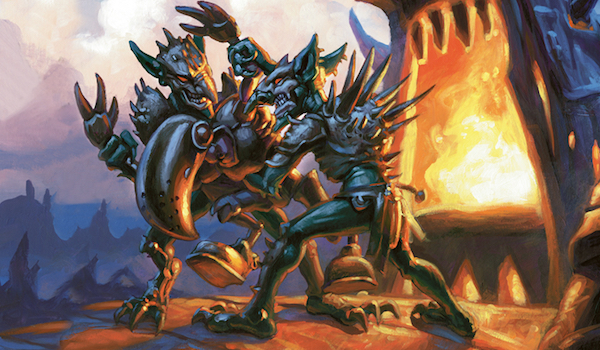
I'll start with the obvious part: nothing got unbanned. I'm sorry for those who have their hearts set on playing with Stoneforge Mystic this year, but it's just not happening. Wizards has an unban roughly once every two years. We're not due another one until next year. It was never in the proverbial cards this time. I wasn't expecting anything to happen at all, but it appears that since Matt Nass can't be banned, Wizards has decided to let other decks win this year and ban Krark-Clan Ironworks. I'll be looking over Wizards's reasoning and the ban's implications for Modern today.
The Announcement
Wizards always includes an explanation of their reasoning for every ban, though it's rare for a single card to get an entire article of justification. I'm not complaining, but it is unexpected. I also agree with their reasoning. The opening is fairly instructive:
...Krark-Clan Ironworks decks have risen to prominence at the Grand Prix level of play, posting more individual-play Modern Grand Prix Top 8 finishes than any other archetype, despite being only a modest portion of the field.
This is similar reasoning to why Splinter Twin was banned: a combo deck that keeps winning everything despite being well known is certainly worrisome. When I previously speculated on how Ironworks could end up banned, GP Oakland hadn't happened. I said that the only way that Ironworks could get banned was if more players picked up the deck. It would seem Wizards was aware of that possibility, but ultimately, it was consistent high performance that did Ironworks in.
...while Ironworks did perform well at the recent Grand Prix Oakland, we do not make B&R decisions based on a single tournament alone. It's the long-term performance of Ironworks over the last year that has given us cause for action. Grand Prix Oakland results reflect that this trend is not slowing down as the metagame adjusts.
Previously, the narrative surrounding Ironworks was Matt Nass's GP streak last year. There wasn't enough evidence to say that Ironworks was an actual problem as long as players were aware of the threat. Having GP appearances is fine, but consistent domination is too much. Apparently, that performance was the tipping point for Wizards.
R&D wholeheartedly embraces the strategic depth and robust rules system of Magic, and the player skill it takes to master them. In many cases, a deck's difficulty to play is a pressure against needing to ban a card, insofar as it suppresses the metagame population and win rate of the deck in the short term. This a major factor as to why R&D had not previously needed to take steps against Ironworks. As time goes on and more players master the deck, we ultimately have to make decisions based on how the deck is performing in the hands of those experts in practice
Interestingly, Wizards was perfectly aware of the rules oddities around Ironworks. This has been a major point of contention around the deck. It's not easy to understand the nuances of playing the deck and even harder to know how to respond. Because mana abilities don't use the stack, Ironworks could exploit some very odd interactions, play around answers in surprising ways (like beating Extirpate), and generally play a very obtuse and confusing game, especially for newer players.
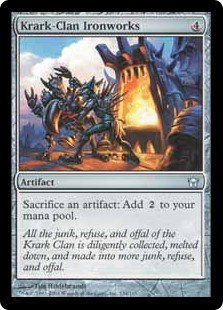 On the one hand, it made it very hard to just pick up the deck and play it, which puts Ironworks in the same ban camp as Amulet Bloom. The metagame share may not have been that high, but that wasn't indicative of the decks power. On the other, it rewarded practice and rules knowledge. As Wizards articulated throughout the article, the deck may not have been popular in the wider metagame, but it was very powerful in the hands of experienced players. There's nothing inherently wrong with that. However, it's clear that the deck is powerful enough to let those highly enfranchised players win a disproportionate amount of the time.
On the one hand, it made it very hard to just pick up the deck and play it, which puts Ironworks in the same ban camp as Amulet Bloom. The metagame share may not have been that high, but that wasn't indicative of the decks power. On the other, it rewarded practice and rules knowledge. As Wizards articulated throughout the article, the deck may not have been popular in the wider metagame, but it was very powerful in the hands of experienced players. There's nothing inherently wrong with that. However, it's clear that the deck is powerful enough to let those highly enfranchised players win a disproportionate amount of the time.
Finally, it's significant that Wizards wanted to only hit Ironworks with this ban. They discussed hitting less important cards to reduce its power, but in the end decided to just end Ironworks for good. I agree with that decision. The power of Krark-Clan Ironworks is high enough that it will eventually be broken again, if the nerf actually has any effect. Best to nip this in the bud before it gets worse.
Impacts
As a result of the ban, Ironworks as a deck is dead. While there are plenty of cards out there which sacrifice artifacts for free, they don't make mana. Thus, any combo deck will need to include rituals or some other mana source to make the combo work. It could work since the Scrap Trawler/Myr Retriever loop is powerful enough. However, that would be a lot of effort to make a deck similar to Storm or Cheeri0s. I won't rule out a return to Eggs-style decks, but I also won't hold my breath.
With Ironworks gone, the metagame will adapt and move on. However, I expect the changes to be fairly subtle. As Wizards noted, Ironworks wasn't a particularly popular deck.
Storming Back
The first thing to note is that with Ironworks gone, Storm should regain its position as the premier multi-piece combo deck in Modern. Ironworks and Storm occupy similar space as unfair combo decks that burn through cards and mana to assemble a kill over the course of the combo.
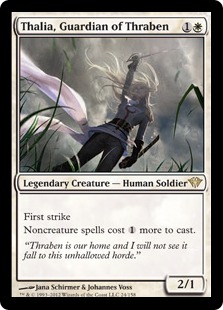 Storm has been losing metagame share steadily since 2017. A not-insubstantial factor was the rise of Humans and Spirits. Aggro-control tends to be very good against combo, since it integrates the deadly combination of disruption and a clock. Ironworks was better positioned against those decks because of Engineered Explosives. This caused some combo players to switch from Storm to Ironworks and further decrease Storm's presence. With Ironworks banned, some will come back to Storm and its stock will rise again.
Storm has been losing metagame share steadily since 2017. A not-insubstantial factor was the rise of Humans and Spirits. Aggro-control tends to be very good against combo, since it integrates the deadly combination of disruption and a clock. Ironworks was better positioned against those decks because of Engineered Explosives. This caused some combo players to switch from Storm to Ironworks and further decrease Storm's presence. With Ironworks banned, some will come back to Storm and its stock will rise again.
Storm is a far healthier combo deck for Modern than Ironworks, so this change will be beneficial. First and foremost, there are no weird interactions or rules issues around Storm, making it comprehensible. Everything works exactly like it should, so new players can follow a combo sequence. The kill is also faster, and arguably more deterministic. Ironworks has to draw through their deck to find a Pyrite Spellbomb to loop. If any of its numerous loops are active, this will happen... eventually. If not, then there's a constant chance to fizzle. Once 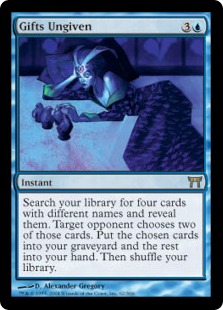 Storm resolves a Gifts Ungiven, they are going to combo unless disrupted. It is still possible for Storm to fizzle, but since they can Gifts to find Grapeshot, it's improbable.
Storm resolves a Gifts Ungiven, they are going to combo unless disrupted. It is still possible for Storm to fizzle, but since they can Gifts to find Grapeshot, it's improbable.
Finally, Storm can be disrupted in expected ways. While the typical combo hate did work against Ironworks, any permanent-based answer except Stony Silence would be answered by Explosives. Ironworks could also combo around just about anything because it was a mana ability. Besides the Extirpate example, Ironworks could also dodge removal on its creatures through clever sacrificing tricks. In fact, timing one-shot disruption was always difficult against Ironworks because they had so many ways to juke past it. Storm can't do that; being easier to disrupt and answer means the deck is better for the format as a whole. Unfair combo isn't necessarily bad for the format, but it has to be reasonable.
Tron Improves Slightly
Tron has a problem 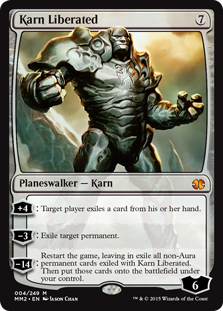 against combo. Karn Liberated is not effective hand disruption, and everything else it plays is slower than the typical combo deck. It can't really play anti-combo cards like Chalice of the Void because it relies heavily on cheap cantrips, too. The better combo decks are, the worse Tron is.
against combo. Karn Liberated is not effective hand disruption, and everything else it plays is slower than the typical combo deck. It can't really play anti-combo cards like Chalice of the Void because it relies heavily on cheap cantrips, too. The better combo decks are, the worse Tron is.
Against Ironworks, Tron's lines proved quite obscure; versus Storm, for instance, players have some easy rules to follow, such as killing the Goblin Electromancer immediately. Ironworks presents Tron with very small windows in which to use Oblivion Stone effectively, and missing them is fatal. Knowing what to hit with Karn is also much harder.
These combined factors lead me to expect an uptick in Tron in the coming months.
Metagame Overall Unaffected
I don't expect there to be any other widespread effect from this ban. Irnoworks never held much of a metagame presence, so there won't be much destabilization. Also, Ironworks wasn't exactly a metagame 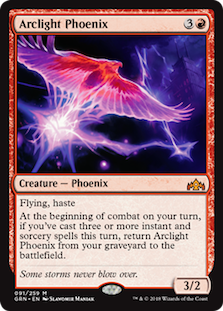 deck: it didn't specifically prey on or fall to any other deck. It was just a combo deck that demanded answers. The fact that it demands very specific answers and can force its way through most normal answers meant that it really chewed through enemy sideboard slots, as players were forced to pack the specific answers needed for Ironworks or bleakly hope for a fizzle.
deck: it didn't specifically prey on or fall to any other deck. It was just a combo deck that demanded answers. The fact that it demands very specific answers and can force its way through most normal answers meant that it really chewed through enemy sideboard slots, as players were forced to pack the specific answers needed for Ironworks or bleakly hope for a fizzle.
The main effect that I expect will be a reduction in sideboard hate against artifacts and graveyards. Considering the recent success of Arclight Phoenix decks and the ever-present threat of Affinity, it remains to be seen whether that choice pays off, but players may adjust their sideboards this way regardless. This will likely cause a burst of unfair decks for the next month or so before the hate returns and things get back under control.
The Additional Clause
Normally, that would be the end of this Banned and Restricted Announcement, but not today. In an unprecedented move, Wizards has tipped their hand about the watchlist.
Ancient Stirrings and Mox Opal are not being given a free pass in perpetuity. While we have no current plans to take action against these two cards, we'll continue to monitor the health of the environment and the strength of decks that use them. If the metagame reaches a point where we determine these cards are doing more to suppress archetype diversity than enable it, we will certainly revisit this discussion.
Ancient Stirrings and Mox Opal were considered for this banning, and are considered potentially bannable in the future. First of all, I'm not a financial specialist, but I'd expect this revelation to have a chilling effect on the secondary market. Secondly, it is interesting that Wizards is at least thinking about these two cards that players have complained about before. They're even reiterating defenses that I hear all the time. It sounds like there's no actual risk of either getting axed any time soon, especially since Affinity and Hardened Scales aren't tearing up the tournament scene. Still, keep an eye on these cards; Wizards may know of something coming down the pipe that could be the final straw.
The Tronish Catch
I'm actually struggling with this clause. Openness and honesty are great things for a company, but I'm feeling conflicted about the possibility of Opal and Stirrings being watchlisted. Whether losing Opal is good or bad is hard to say, but at this point, losing Ancient Stirrings could be devastating.
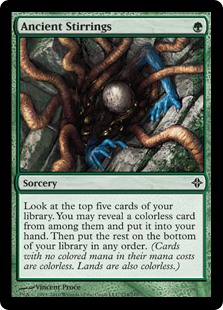 I know that I frequently grouse about Stirrings, but I've come to see it as integral to Modern's balance. Tron is beneficial to Modern because it keeps out prison decks: many Lantern players agree that Tron is an unwinnable matchup. There are too many cards that need to be Pithing Needleed or milled away: Karn, Oblivion Stone, Ulamog, and World Breaker can all break the lock. And unless Breaker is hit by Pyxis of Pandemonium, it comes back from the grave. The same is true for the Grixis Whir decks; Tron doesn't care if the board is locked when Ulamog eats anything.
I know that I frequently grouse about Stirrings, but I've come to see it as integral to Modern's balance. Tron is beneficial to Modern because it keeps out prison decks: many Lantern players agree that Tron is an unwinnable matchup. There are too many cards that need to be Pithing Needleed or milled away: Karn, Oblivion Stone, Ulamog, and World Breaker can all break the lock. And unless Breaker is hit by Pyxis of Pandemonium, it comes back from the grave. The same is true for the Grixis Whir decks; Tron doesn't care if the board is locked when Ulamog eats anything.
Without Stirrings, would Tron still be good enough? Damping Sphere and Field of Ruin already mean the midrange matchups aren't the slam-dunk they used to be. Losing their lynchpin cantrip may be the final blow for Tron. This may invite the potentially less fun outcome of a prison resurgence.
Carry On
I expect Modern to continue on its current course with little disruption from this ban. Wizards chose to deal with Ironworks while it was still a mostly theoretical problem. I welcome this change and hope that the year doesn't bring anything else as weird and busted as Ironworks.




I just interpreted the “not being given a free pass in perpetuity” statement as an affirmation that unlike Legacy and Vintage, Modern does not have officially recognized “pillars” or “sacred cows”. Brainstorm will never be banned in Legacy no matter how small and constrained the metagame niches for non-blue decks become; likewise, Mishra’s Workshop will never be restricted in Vintage. On the other hand, if Modern somehow reaches a state where, say, the top three decks by GP top 8s over the course of an entire year are Tron, Hardened Scales and Lantern…
There was some silly talk on Twitter before and after the B&R that “Mox Opal is the Workshop of Modern”–implying that its status as one of the most expensive cards in the format renders it immune to scrutiny. The comparison to Workshop is doubly silly because KCI is the first card *ever* to be banned from an Opal deck since the Mirrodin artifact lands were put on the initial ban list (Eggs didn’t play Opal because simultaneously recurring multiple copies of Opal didn’t work under the legendary rule of the time–all the copies would die before you could use any of them). The Vintage restricted list, on the other hand, is littered with artifacts that have only ever seen play in Workshop decks.
Hey David,
Thanks for walking us through all this, I-like most–will not be sad to see KCI go, but that being said I don’t typically want to see anyone lose a deck. Given that KCI was by and large considered a boogie man in the format what do you think will rise to take that mantle? Are Phoenix decks going to take that throne? Does this then put Faithless Looting on the proverbial radar? (Should Wizards be monitoring that anyway — probably.) If so, should we avoid buying in? What are your thoughts on Looting, Phoenix, etc.?
I don’t consider any deck to be a true boogeyman at this point. The only reason Ironworks could have been in my mind was the incorporation of Explosives and the rules exploits. Every deck that I know about can be beaten by any deck if they want to do it and by normal means, so I don’t see anything taking Ironwork’s place for the time being.
As for Looting, that’s hard to say. On the one hand Looting is the best graveyard enabler in Modern, the best velocity card, and arguably card advantage. However, no Looting deck other than Dredge has stuck around very long. Last spring everyone was singing Mardu Pyromancer’s praises and today the deck is non-existent. Similar story for Hollow One. There’s no reason to think that Phoenix will be any different, and so no reason to believe that Looting needs to go.
That said, on paper Hollow Phoenix is a very scary deck though it’s done nothing in reality. If someone finds a way to really unlock its power then Looting would be the card to go. Unless that happens or another incredibly broken deck emerges, I think Lootings safe.
You brought up a good point that I hadn’t considered before until you mentioned it at the end about the potential banning of Ancient Stirrings and that is the rise of Latern Control as a result. Albiet, Lantern Control implements A.S. as well, I don’t see it crippling it to the point of ‘last nail in the coffin’ the way Tron would get hit. You said it perfectly, “less fun outcome” if the banning of A.S. does manifest. I’ve been playing Jund lately and I hate losing to Tron but I think losing to Lantern Control (doesn’t matter what deck you are playing) feels much worse. As much as I dislike Tron I feel like its a corner stone in Modern’s meta-game.